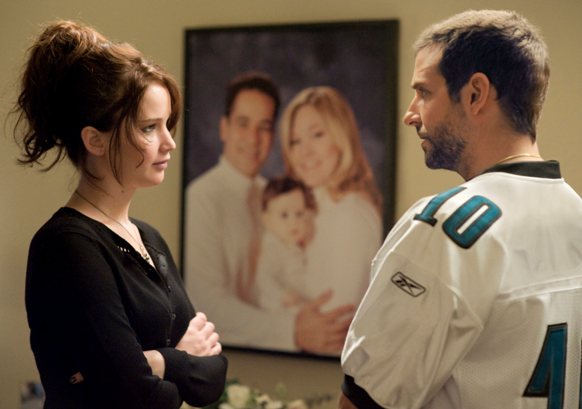David O. Russell has a thing with overstatement, it’s fair to say. His films are often accentuated by the exaggerated and the improbable – the incest of Spank the Monkey, the mega-heist of Three Kings. This tendency spills over onto the other side of the camera, one gathers; on set bust-ups with George Clooney and Lily Tomlin (the latter, in full excruciating detail, can be viewed on YouTube) certainly suggest as much. Still, this isn’t necessarily a bad thing. It’ll be hard to accuse the director of lacking the passion needed to drive his craft.
But this tendency can make his cinematic missteps all the more obvious. Take his new film, Silver Linings Playbook. Its exaggerations shouldn’t surprise; in fact, the larger than life characterisations and set up serve to underscore an interesting point – more on that in a moment. But there is a downside: deliberate or not, wilful overstatement can easily mask elaborate sleight of hand. Whilst one is distracted by the grandstanding, a multitude of cinematic evils take the opportunity to creep in undetected…
Pat Jr.’s undiagnosed bipolar disorder rips to the fore abruptly when he discovers his wife in flagrante with a work colleague; the ensuing contretemps costs him his house, his job, his wife, pretty much his life. A spell in a mental health facility spares him a lengthy prison sentence, but discharge into the care of his elderly parents leaves him bereft of everything except the perhaps quixotic desire to win his wife back at all costs. Every setback can be overturned, Pat Jr. believes: every cloud has a silver lining.

But Pat Jr. as Pollyanna is just one segment of a deeply dysfunctional whole. His father, Pat Sr, is an American football obsessive – very much in the clinical sense – who relates to his son primarily as the good Ju-Ju that can urge his beloved Philadelphia Eagles on to victory. Best friend Ronnie escapes from the overwhelming emotional crush of a new baby and a domineering wife by hiding in the garage, listening to heavy metal. And then there’s Tiffany, Ronnie’s sister-in-law.
Recently bereaved, Tiffany is direct, abrupt and deeply disconcerting. She also happens to be the only person willing to help Pat Jr. beat his restraining order to establish contact with his estranged wife. But in this topsy-turvy world, there is no such thing as a free lunch. They form an uneasy alliance: Tiffany will pass a letter on to Pat’s estranged wife, if he agrees to partner her in a dance competition. Both parties seem to be getting something that they want: but it is a bit of a toss up, whom should be more concerned about receiving what they wish.
As it happens, the unlikely partnership of Pat Jr. – played ably, and for much of the film against type, by Bradley Cooper – and Jennifer Lawrence’s Tiffany does provide much food for thought. The two are both are damaged goods, both with remarkably skewered perspectives on life (the scene where Pat Jr. rages against the perfidy of Ernest Hemingway and his downbeat storytelling is just one excellent example). Their off-kilter engagement with life and the things that matter to them give an unexpectedly poignant insight into experience of mental ill health. The characters make one laugh, but they aren’t played for laughs: this is an important distinction. Combined with jittery, juddering camerawork and unexpected changes of narrative pace, Russell starts to shape an interesting portrait of the emotionally unwell without succumbing to pathology.
But that’s all about the overstatement.
Beneath the bombast, Silver Lining Playbook manages to add up to less than its constituent parts. It is unfair, granted, to castigate the film merely on the grounds of smuggling a rom-com storyline – an offbeat rom-com, admittedly, but still – under false pretences. After all, even the emotionally fragile are entitled to fall in love, and it soon becomes clear that Tiffany wants to be the third side of an extremely uneven love triangle. But the convoluted narrative device with which Russell – whose screenplay is adapted from Matthew Quick’s 2008 novel – sets up the denouement stretches patience and credulity. The actors do their best with some pretty uneven material. Still sterling performances – Jacki Weaver’s turn as the harassed mother and wife obliged to play straight woman between the two Pats comes to mid – is offset by redundant roles fulfilled by bland acting-by-numbers (Chris Tucker, take a bow.)
This not to say that Silver Linings Playbook is a bad film, just a deeply unsatisfying one. The underlying sub-theme of masculine emasculation – frailties pushed by the prevailing economic recession, prompting the desperate grasp on slivers of certainty – comes across all the more strongly through its understatement, curiously enough. But all this is underdone by the grievous harm done to Tiffany through Russell’s script and direction. Lawrence, just 22, is already an accomplished actress with a brilliant future ahead of her. Tiffany’s histrionics don’t do her any particular favours as an actress, but a competent turn reminds us of both her range and adaptability as an actress. But her character’s presence – sneaky, self-centred and shamelessly manipulative – is ruthlessly sacrificed once the film remembers what it wants to be, which is harmless crowd-pleasing fluff. Ultimately, Silver Linings Playbook’s most egregious offence is playing safe when a bit of bombast and overstatement might have served it well.
Silver Linings Playbook (USA, 122 min, 2012, English with Hebrew subtitles) – now showing in Israeli theatres.





